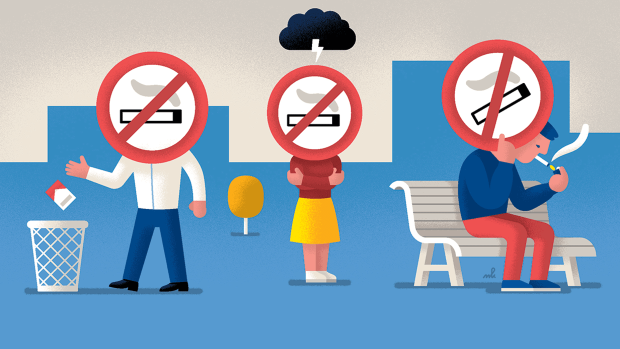
The neighbourhood is saved: we are being called out for smoking a cigarette
When Nikola Edelsztejn recently read about the Amsterdam municipality’s trial to establish a smoke-free zone in the Roetersstraat, on the edge of the Roeterseiland campus, his first thought was: who does this help? “I am pretty sure that I and other smokers will continue to enjoy our smoke break on the corner with the same ease.”
“Don’t live in a city if you can’t handle the pollution”, is a mantra I picked up during my time living in the Romanian capital Bucharest. Almost every street you walk down is littered with cigarette butts, here and there a tissue with unwanted substances, and then the smell of urine or, on Saturday evenings, vomit.
You could complain about this at length, and people who come from the countryside or are visiting the city for the first time will undoubtedly do so, but it is also a simple characteristic of the always somewhat anarchic structure of a city.
Amsterdam is and remains a big city, and when we look back at its history, we can hardly call it civilized: the area around Weesperplein and Wibautstraat, where many UvA students can still draw the street map after six shots of vodka on the rocks, was the place to be for homeless people and junkies in the 1980s. Not a chic sight, but typical of a big city.
The municipal council’s decision to clean up such places often results in the problem moving elsewhere and even worsening at the new location: the well-known waterbed effect.
The folly of social engineering
The Netherlands has traditionally been a country that has been at the forefront of the idea that society can be engineered and that politics has a mandate to create model citizens, which is not only extremely naive but also misplaced arrogance. For a country that wishes to present itself as sensible, rational, down-to-earth, and responsible, it is particularly paradoxical that confidence in the rationality of its citizens is so low that measures are needed to make them behave in the socially desirable manner imposed on them.
This ignores the fact that most people naturally accept unwritten norms and act accordingly. This is also the case with smokers: it used to be normal to smoke in a closed car with two toddlers in the back seat, but nowadays everyone knows the dangers of this and that it is not a good idea. We therefore need a sense of values, whereby people refrain from an action based on an awareness of its consequences, in order to obey a commandment. In the case of a smoking ban on the street, in the middle of the city center, this does not seem to be the case at all.
Unique perspective
Michel van Wijk, initiator of the plan and member of the Centrum district committee, argues that voluntary compliance and social encouragement are necessary to enforce the smoking ban. This is a unique perspective, as it means that the task of enforcement falls to local residents, who must approach smokers and ask them to stop. A sublime plan in a city where people are reprimanded for accosting cyclists who run red lights.
I understand that non-smokers may feel frustrated by the fact that someone is smoking, but let’s be honest: the exhaust fumes from the delivery van bringing supplies to the entire neighbourhood because the supermarket around the corner is too far away are not exactly beneficial to health either.
Perhaps it is time to accept that cities are dirty and that smoking a cigarette on the street means nothing more than: if it bothers you, I’ll stand a little further away from you.
Nikola Edelsztejn is a writer and bachelor’s student in Law at the UvA. After the summer, he will start as a regular columnist for Folia.


